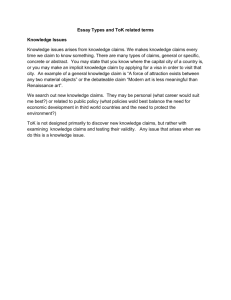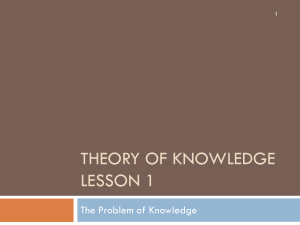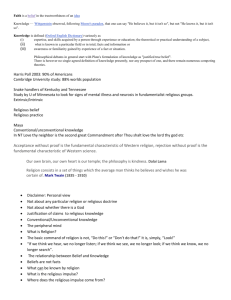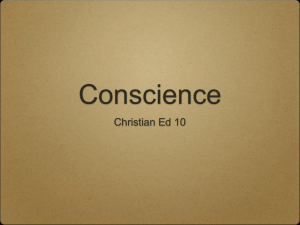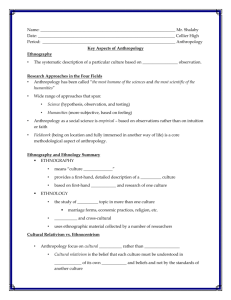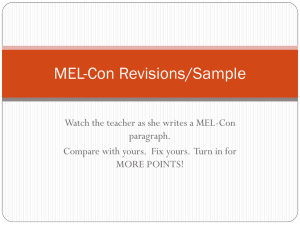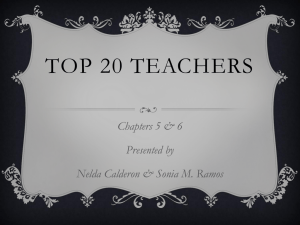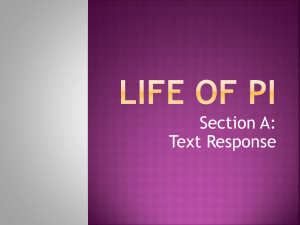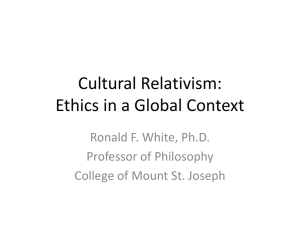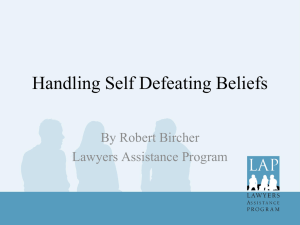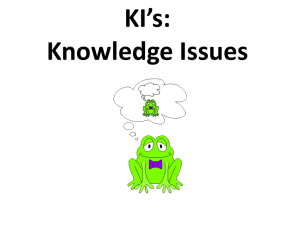*The Unexamined Life is not worth living.* *Socrates ToK
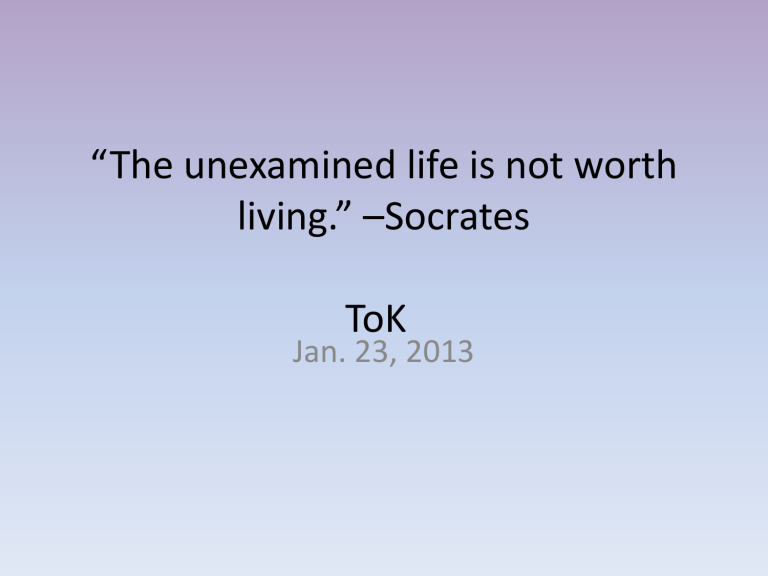
“The unexamined life is not worth living.” –Socrates
ToK
Jan. 23, 2013
Warm up your brains
Ruminations on yesterday’s knowledge issues/quotes/blog/etc.? What did you write about?
(Today begins participation points!)
Problems of Knowledge
1. Certainty
List four things of which you are certain. When you have four things, share with a classmate.
• I know that Neil Armstrong landed on the moon in 1969.
• I know that strawberries are red.
• I know that if a is bigger than b and b is bigger than c, then a is bigger than c.
• I know that murder is wrong.
2. Radical Doubt
(Rene Descartes 1596-1650— I exist.)
Are you certain you exist? Could you be dreaming? Could this be a matrix?
Are some areas of knowledge more certain than others?
3. Relativism
The opposite of certainty: there is no such thing as absolute truth that exists in an objective way independent of what anyone happens to believe is true. “True for me is false for you.”
Contradiction—the world cannot be both round and flat. SO, does relativism only apply to beliefs? How does relativism apply to culture?
Moral Relativism
• ToK under attack—abstract concepts such as free will and justice are hard to define and vary from culture to culture and change over time. ToK is at the heart of controversy where claims that it is anti-American and parades “critical thinking” which teaches students to question everything and believe in nothing…
• Not so. Questioning is another way we understand, globally and locally. Welcoming dialogue in controversial topics combats isolationism.
4. Common Sense
• What is common sense?
5. Bias
Is there such a thing as an innocent eye or an unbiased mind?
6. Gullibility
• Gossip
• Conspiracy theories
• Mob mentality
• Consider your source!
January 24, 2013
TOK
If a tree falls in the forest and no one is there to hear it, does it make a sound?
Info/announcements
• BLOG—you must submit for review on the lightspeed block. Knowledge through contraband!
• CAS small group meetings:
1/22 Tuesday 4 th : Josh H, MacKenzie C, Taylor Riley
1/22 Tuesday 7 th : Scarlet K, Liam H, Carson Kadas
1/23 Wednesday 4 th : Colin D, Addie M, Madison R
1/23 Wednesday 7 th : Aicia B, Savannah, Abby B
1/24 Thursday 4 th : Amanda N, Taylor P, Kyle T
1/24 Thursday 7 th : Mikayal N, Ryan E, Thomas N
1/25 Friday 4 th : Hailey J, Katy S, Koada C,
1/25 Friday 7 th : Korbin B, Erin J, Patrick M, Alice B
Review:
Yesterday, in ToK we began discussing the problems of knowledge, or what we believe to be certainties. We learned that to poke holes in "certainty", we ask questions. Some other problems of knowledge lie in Radical Doubt, Relativism,
Common Sense, Gullability, Skepticism and Judgment. While these last two are actually required elements of seeking knowledge, they can be taken too far. More on these topics can be found in Theory of Knowledge (book), pages 1-22.
•
• The certainties that are most difficult to poke holes in are the "I feel" statements-we will talk about this when we get into emotional knowledge in more depth.
• Some questions raised by the class today:
• Who has more responsibility for learning, the learner, the teacher or the environment?
• Where do convictions fit in?
• Do we choose to learn things? Can we choose not to learn things?
• What about human tendency? Is this the same as instinct?
• What changes about learning from childhood to near-adulthood?
• Is belief/faith a matter of emotional connection?
6. Skepticism/Judgment
Skepticism is a good thing. However, being too skeptical may also take its toll. It can cause intellectual progress to grind to a halt.
Early 19 th century example:
Can rocks fall from the sky?
NO!
What about meteorites!
Oh. Yeah. Right.
*BEWARE: Don’t accept mere negativity as skepticism. Hope, faith, and belief are part of what make us human. See relativism.
“Truth does not exist” is, at its heart, contradictory.
Out of doubt comes knowledge.
Endeavor to become skeptical .
Provoke others into thought; resist complacency.
Reasonable Knowledge
• Evidence: Is there evidence that supports your belief?
• Coherence: Does your belief fit in with our current understanding of things?
• Confirmation Bias: We only notice evidence that supports our beliefs. Beware!
• Argument ad ignorantiam: Trying to prove something is true by saying that you can’t prove that it isn’t.
Beware!
– Example—I believe there are little green men on Mars, because no one has proven that there isn’t.
When beliefs affect action
• Salem Witch Trials
• Cigarette companies
• Heaven’s Gate Cult mass suicide (1997)
• Sexist/Racist comments and actions
• Can there be wrong, misguided, or dangerous beliefs?
• What is the opposite of knowledge?
– Innocence and purity? Garden of Eden
– Ignorance? (Is ignorance bliss?)
– What you don’t know can indeed hurt you.
However, seeking knowledge is not a journey from which you can return. With knowledge comes some loss of wonder. Ex: Santa Claus
January 25,2013
Announcements:
Don’t forget the blog (Saturday, Jan. 26)
Don’t forget the survey
Problems of Knowledge: Knowledge issue connections to AoK and WoK
• Perception: How trustworthy are our senses?
• Reason: How can we justify logic?
• Emotion: How reliable are our feelings and emotions?
• Language: Does some knowledge lie beyond language?
• Religion: Can we know what the meaning of life is?
• Ethics: Are values objective or subjective?
• Arts: Do the arts give us knowledge?
• History: Can history be unbiased?
• Human Sciences: Can human behavior be predicted?
• Natural Sciences: How certain is scientific knowledge?
• Maths: How does mathematics relate to the world?
Words to Ponder: conviction, intuition, instinct.
Reading excerpts:
“The Uncertainty of Knowledge”
“Science’s Finest Hour”
Strengths and Limitations—We all have these.
So do the topics, epistemologies, beliefs, and pieces of evidence we will ponder. These are not abrupt edges of “CAN” and “CANNOT”, but softer, grey abstractions where we approach our abilities of comprehension.
A word about faith and belief…
We will be examining the certainties at which we arrive based on faith and belief. Rather than toss knowledge in these areas out the window, understand and acknowledge that these things add to our humanity.
Not only have countless wars been waged over belief and faith, but some of the most beautifully intriguing cultures have developed over centuries around them as well.
Discounting such things as frivolous knowledge would greatly deficit our collective wisdom. Rather, ask, “How do we/they know what we/they know through the lens of our/their faith?”
The Continuum
-10
Uncertain
Undefinable
Individual
Impossible
-5 0 5
Certain
Reliable
Universal
10
Place your sources of knowledge on this scale in your notebook. When you have done that, choose three of them and add them to the scale on the board.
The Three Little Questions
• How is knowledge acquired?
• How is knowledge presented?
• How is knowledge evaluated?
• How is knowledge passed on?
Create a visual representation.

